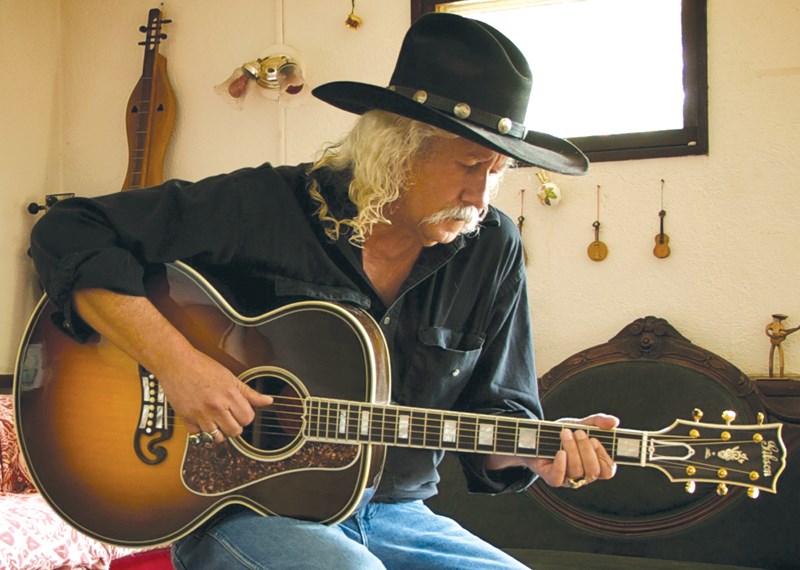Arlo Guthrie, Running Down the Road tour, Kay Meek Centre, Sunday, April 30. For more information visit arloguthrie.com.
Are today’s YouTube chroniclers, Facebook aficionados and Twitter personalities the folk artists of their time, commenting on the day’s events with a caustic wit and empathetic eye for detail?
Well, hardly. But folk legend Arlo Guthrie might suggest there’s a clearer connection between social media and folk music than one might expect.
“Folk music was the original social media,” says Guthrie, the singer-songwriter best known for shining a light on numerous social injustices through his songs of protest.
“From my perspective, it’s not populism that’s a problem – it’s authoritarianism. And folk music, like all socially connected art, reflects the times. It also connects other times, other people and other places, and becomes a link in a chain of people who share common ideas.”
Guthrie, 69, calls it like he sees it. As a folk artist – and the son of folk pioneer Woody Guthrie – that shouldn’t come as a surprise to anyone.
“My dad used to say, ‘You can only write what you know.’ I took that to mean, be true to yourself, and your world. My songs and stories are based on the world I grew up in, and continue to live in,” Guthrie (Arlo, not Woody) says.
The song Guthrie is best known for, “Alice’s Restaurant Massacre,” is from the singer’s 1967 debut album Alice’s Restaurant.
The largely spoken-word track, which runs for over 18 minutes and has become a perennial Thanksgiving favourite in the U.S., tells the true-to-life tale of a character who is refused entry into the U.S. Army after receiving a citation for littering during the Thanksgiving of 1965.
The satirical song pokes fun at the military industrial complex and underscores the absurdity of a military’s refusal to allow a citizen to enlist due to littering even while the army itself commits atrocities far worse overseas.
Ultimately, the song encourages listeners to fight authority and refuse the draft.
“It’s kind of funny that ‘Alice’s Restaurant’ keeps staying somewhat relevant so many years after it was written. But it’s always a good idea to poke fun at authority, especially when authoritarianism becomes popular,” Guthrie says.
Last year Guthrie and his band rolled out the Alice’s Restaurant 50th Anniversary Tour in order to celebrate the recording. This year Guthrie has been performing the Running Down The Road Tour, named after the eponymous 1969 release.
Guthrie says there will certainly have some carry-overs from last year’s Alice’s Restaurant Tour, but will otherwise be a completely different show. The setlist will feature an assortment of Guthrie tracks from throughout his career, as well as some intricately performed takes on classics from Bob Dylan and other traditional folk songs.
“When I began being an entertainer we usually had a two-hour time limit to the shows we were doing. That hasn’t changed in 50 years. So, after five decades of adding to the catalogue there’s a little more distillation that has to take place,” Guthrie says.
After being active for the past half-century, he is still consistently going at it, his connection with fans and folk music just as strong as it ever was.
He says that as his generation of peers begins to fade into history, the more concentrated their important ideas and notions have become – something he tries to get across during his shows.
“The ideas we shared, the dreams and experiences we had were – and remain – unique. Now we’re getting ready to hand the world to younger people, and I guess those values are handed down in songs as well as other ways,” he says.
Guthrie has never truly considered himself a pop or popular singer (his only Top 40 hit was a cover of Steve Goodman’s “City of New Orleans” in 1972), but he has consistently put out recordings, as well as performed in film and television, for decades now.
He promises that his current tour will feature performances of some new songs as well, in addition to live renderings of songs he has never officially recorded.
He thinks it’s still important to listen to, appreciate and create protest music, but he admits it’s not part of the cultural conversation the way it once was.
“Different kinds of music reaches different audiences,” he says. “You won’t find what we used to call protest songs as a big part of the music industry, so you won’t hear it on radio or see it on TV. That doesn’t mean it’s not there. It gets to where it needs to go.



